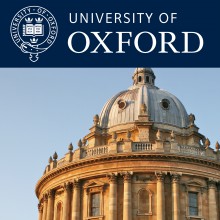
The Cantemir Institute (CI) is a recently established centre of research at the Faculty of History, University of Oxford, which focuses on the interdisciplinary study of Central and Eastern Europe in its wider European, Eurasian, Mediterranean, and global contexts. The creation of the institute has been made possible through a generous donation from the Berendel Foundation, London.
The Cantemir Institute aims to reflect critically on the legacy of intercultural humanism bestowed by two humanist princes: Demetrius Cantemir (1673-1723), the ruling prince of Moldavia (1693; 1710-11), and his son Antiochus (1709-1744), Russia's ambassador to London and Paris (1731-1744). These distinguished polymaths were steeped in the intellectual culture of both Eastern and Western Europe and knowledgeable about the Ottoman and the Russian empires.
| # | Episode Title | Description | People | Date | |
|---|---|---|---|---|---|
| 11 | Creative Commons | Two opposed catholic nationalisms: Ukrainian Galicians in the Second Polish Republic (1923-1939) | Dr Alessandro Milani (EHESS, Paris) gives a talk for the Cantemir Institute East and East-Central Europe seminar series. | Alessandro Milani | 13 Mar 2013 |
| 10 | Creative Commons | Family systems in historic Poland-Lithuania: Demographic perspectives on civilisational divide in Eastern Europe | Mikolaj Szoltysek (Max Planck Institute for Demographic Research, Rostock) gives a talk for the Cantemir Institute on 12th February 2013. | Mikolaj Szoltysek | 06 Mar 2013 |
| 9 | Creative Commons | Encountering and Appropriating Cityscapes: Lviv and Wroclaw after 1944/45 | Sofia Dyak (Center for Urban History, Lviv) gives a talk for the Cantemir Institute. | Sofia Dyak | 06 Mar 2013 |
| 8 | Creative Commons | Abbasid Culture and the Universal History of Freethinking | Professor Al-Azmeh, Professor in the School of Historical and Interdisciplinary Studies, Central European University, Budapest, gives a talk for the Cantemir Institute. | Aziz Al-Azmeh | 06 Mar 2013 |
| 7 | Creative Commons | Utopia and Terror: How interdisciplinary methodologies can help us understand violent societies. The example of Croatian Ustasha regime | Part of the Cantemir Institute seminar series. Rory Yeomans, senior research analyst at the Ministry of Justice, gives a talk on how interdisciplinary methodologies help us understand violent societies. | Rory Yeomans | 12 Feb 2013 |
| 6 | Creative Commons | Bygone Glories and Frivolous Pleasures: The Rococo Revival and National Identity in Austrian and Hungarian Art, 1840-1860 | Part of the East and Est-Central Europe Seminar series. Dr Nóra Veszprémi (Cantemir Fellow, Budapest) gives a talk on art and identity in Austria and Hungary in the mid 19th Century. | Nóra Veszprémi | 24 Jan 2013 |
| 5 | Creative Commons | Majorities and Minorities in Interwar Timişoara: Between Fictive and Ethnicity and Ideal Nation | Professor Victor Neumann (West University of Timisoara) delivers a lecture as part of the East and East-Central Europe Seminar Series at the Cantemir Institute. | Victor Neumann | 19 Oct 2012 |
| 4 | Creative Commons | Marxism and the Kemalist 'Sonderweg' (through the eyes of the Turkish Communist poet Nazim Hikmet) | Professor Halil Berktay delivers the final lecture in the Trinity term East and East Central Europe Seminar Series. | Halil Berktay | 28 Jun 2012 |
| 3 | Creative Commons | Transformational Leap as the basic Metaphor of Russian Sonderweg Theories | Professor Andrei Zorin presents the third East and East Central Europe seminar lecture for the Cantemir Institute on Thursday 7 June. | Andrei Zorin | 28 Jun 2012 |
| 2 | Modernist Writing and Modernist Events: Fictions of Holocaust | Often described as one of the most important historical theorists of our times, Hayden White discusses the ethical and aesthetic implications for discourses dealing with the Holocaust, genocide and industrialized death. | Hayden White | 27 Jun 2012 | |
| 1 | Creative Commons | Institutional hypocrisy: the Imperial Diet in the 18th century - a German Sonderweg? | Professor Barbara Stollberg-Rilinger (University of Münster) delivers a lecture as part of the "East and East-Central Europe: Special Paths (Sonderwege) in European Perspective" seminar series. | Barbara Stollberg-Rilinger | 25 May 2012 |
